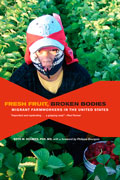We're undergoing a website migration. Please pardon any intermittent outages.
Fruits of oppression: Plight of migrant farmworkers at center of Fresh Fruit, Broken Bodies
 FRESH FRUIT, BROKEN BODIES: MIGRANT FARMWORKERS IN THE UNITED STATES
FRESH FRUIT, BROKEN BODIES: MIGRANT FARMWORKERS IN THE UNITED STATES
By Seth M. Holmes, Ph.D., M.D.
Published by University of California Press, $27.95
Reclaiming a space for legitimate anger
In a departure from the norm, NCR was sufficiently intrigued by a recent book to ask three of our younger married writers to review it. As a bonus, we asked the reviewers if they would mind introducing us also to their families.
NCR will publish one book review a week for the next three weeks.
-- Arthur Jones, books editor
THE NEW FEMINIST AGENDA: DEFINING THE NEXT REVOLUTION FOR WOMEN, WORK, AND FAMILY
By Madeleine M. Kunin
Published by Chelsea Green Press, $26.95 hardback, $17.25 paperback
Every semester I stand in front of a group of undergraduates and introduce the intellectual journey we will take together throughout the next few months. As part of these initial class meetings we inevitably turn to personal introductions, where students and I say a little about who we are and why we are in this class. My intellectual and personal narrative inevitably includes my self-identification as a feminist. This comment is met most often with scrutiny and suspicion. I quickly have to define feminism and reassuringly inform them not to worry; I am not an angry feminist.
Difference fundamental to our world
BEING ABOUT BORDERS: A CHRISTIAN ANTHROPOLOGY OF DIFFERENCE
By Michele Saracino
Published by Liturgical Press, $29.95
As a Cuban-American born in the Unites States, I grew up with a strong sense of being different. It is nothing I ever sought out. Yet markers of my everyday life, such as my parents’ thick accents and the black beans on our dining room table, quickly instructed me that I was not like most typical girls in the United States. This difference was a source of joy and pain throughout my childhood. Years later, as an academic I began to intellectualize that sense of difference. I found a home in the voices of Latino/a and feminist theologians that highlighted difference and diversity and the function of power within our culture’s sense of what is “normal” and what is different.
Author evokes passion for racial justice
Having been baptized into the waters of liberation theologies through a course on black theology as an undergraduate at Georgetown University, I eagerly sat down to read ethicist Bryan Massingale’s volume Racial Justice and the Catholic Church. The cynic in me would have placed a question mark at the end of those four words, yet Massinagale’s book does not allow for such broad stereotyping. As he reminds the reader early on, the focus of his book is both the contributions and the limitations of Catholic social thought on racism.
I must confess that in my eyes the limitations greatly outweigh the contributions. While there are moments in the U.S. church’s history that embody a public denouncement of racism, this is not a definitive feature of the church. I think, for example, of Los Angeles Cardinal Roger Mahony’s current public protests of Arizona’s immigration law and his work with Cesar Chavez on behalf of farm workers when he was first ordained a priest in the 1960s. The examples, unfortunately, are exceptions rather than the norm.
Advertisement
Advertisement
Advertisement
Advertisement
Advertisement
Advertisement
Advertisement
Advertisement
